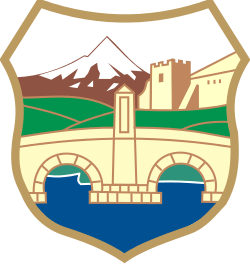Tauresium
| Тауресиум (Macedonian) | |
|
Remains of building walls in Tauresium | |
 Shown within Republic of Macedonia | |
| Alternate name | Gradište |
|---|---|
| Location | Taor, Skopje Statistical Region, Republic of Macedonia |
| Region | Dardania |
| Coordinates | 41°53′53″N 21°36′41″E / 41.89806°N 21.61139°ECoordinates: 41°53′53″N 21°36′41″E / 41.89806°N 21.61139°E |
| Type | Settlement |
| Site notes | |
| Archaeologists | Arthur Evans |
| Website |
www |
Tauresium (Macedonian: Тауресиум, Ancient greek Tavresion, Ταυρήσιον) or known as Gradište (Градиште) is an archaeological site in Macedonia, located approximately 20 kilometres (12 mi) southeast of the capital Skopje. Tauresium is the birthplace of Byzantine Emperor Justinian I (483) and King Theodahad of the Ostrogoths (480).[1][2]
Location and general characteristics
Tauresium is located in Zelenikovo Municipality, near the village Taor, some 20 kilometres (12 mi) southeast of Skopje. The site was discovered by British archaeologist Arthur Evans in the late 19th century. According to Justinian's biographer Procopius, the Emperor was born in Tauresius in 483, more precisely in the castle of Baderiana, which is the modern village Bader . About the town, Procopius in his book "De aedificiis" states:
"...Among the Dardanians of Europe who live beyond the boundaries of the Epidamnians, close to the fortress which is called Bederiana, there was a hamlet named Taurisium, whence sprang the Emperor Justinian, the founder of the civilised world. He therefore built a wall of small compass about this place in the form of a square, placing a tower at each corner, and caused it to be called, as it actually is, Tetrapyrgia. And close by this place he built a very notable city which he named Justiniana Prima (this means "first" in the Latin tongue), thus paying a debt of gratitude to the home that fostered him..."[3]
Tauresium and the castle Baderiana were destroyed in an earthquake in 518 and the epicentre of the earthquake was in the nearby city of Skupi. As a gesture of gratitude to his birthplace, Justinian I rebuilt the city. According to the excavations that has been done so far, it is estimated that the oldest parts of Tauresium date from the 4th century and this oldest part is a castle with four towers known as Tetrapirgia. Regarding Baderiana, Procopius states that it is settled castle with oddments from IV-VI century.[2] Baderiana or the modern Bader is located 6 km east of Tauresium and Taor.
References
- ↑ Wolfgang Kuhoff (1996). "Theodahadus, Flavius, König der Ostgoten 534-536". In Bautz, Traugott. Biographisch-Bibliographisches Kirchenlexikon (BBKL) (in German) 11. Herzberg: Bautz. cols. 824–832. ISBN 3-88309-064-6.
- 1 2 "Archaeological site Tauresium" (in Macedonian and English). Museum of the city of Skopje. Retrieved 26 January 2011.
- ↑ "The Buildings of Procopius".
External links
| Wikimedia Commons has media related to Tauresium. |
- tauresium.info - web page dedicated to Tauresium.
| ||||||||||||||||||||||||||||||||||||||||||||||||||||
